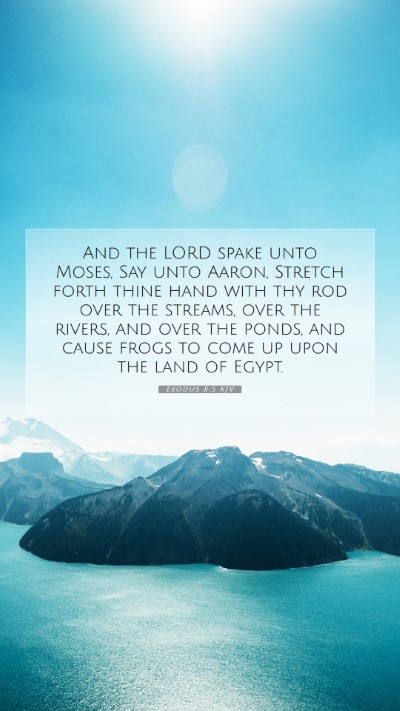Understanding Exodus 8:5: A Comprehensive Commentary
Exodus 8:5 is a pivotal verse in the narrative of the plagues of Egypt, representing God's power and the struggle between divine authority and human rebellion. The verse states:
"And the Lord said to Moses, 'Say to Aaron, "Stretch out your hand with your staff over the rivers, over the canals, and over the pools, and make frogs come up on the land of Egypt."'"
To fully grasp the meaning of this verse, we will draw insights from various public domain commentaries.
Bible Verse Meanings and Interpretations
This verse illustrates God's command to Moses regarding the first plague of frogs. The implications of this directive can be understood through several key points:
- Divine Authority: God is exerting His power over creation by utilizing Moses and Aaron as His instruments.
- Judgment Against Egypt: The plague of frogs serves as a judgment against the Egyptian gods, particularly Heket, the frog goddess associated with fertility and childbirth.
- Obedience and Action: The act of stretching out the hand and staff signifies obedience to God's command, emphasizing that faith must be accompanied by action.
Commentary Insights
According to Matthew Henry, this verse underscores God's sovereignty over nature. He points out that the command to bring forth frogs highlights God's ability to control the very elements that the Egyptians worshiped. Such a display of power serves both as a warning and as a demonstration of God's rightful place as the ultimate authority.
Albert Barnes emphasizes the significance of the staff, which symbolizes God's power and the authority granted to Moses. Barnes notes that the staff, used in previous miracles, reaffirms Moses as a leader in this divine mission. The act of stretching forth the staff is a visual representation of God's command being executed on Earth, reinforcing the relationship between divine instruction and human cooperation.
Adam Clarke adds an interesting historical context, suggesting that the Egyptians had a polytheistic system where frogs were revered and protected. Therefore, the response to this plague can be seen as a direct challenge to their beliefs. Clarke elaborates that the plague, while a demonstration of God's power, also serves to reveal the futility of idol worship, as the frogs ultimately became a source of anguish for the Egyptians.
Practical Applications of Exodus 8:5
The verse provides several teachings that can be applied to daily life:
- Recognizing God's authority over all aspects of life encourages believers to submit to His will.
- The importance of obedience and faith in action reminds Christians of their role in fulfilling God's plans.
- This narrative challenges believers to consider the idols of modern life and reflect on their own priorities and values.
Cross References
Exodus 8:5 connects with several other passages that enhance our understanding of its significance:
- Exodus 7:19: God’s command to strike the waters to bring forth an earlier plague.
- Exodus 8:2: The proclamation of the impending plague of frogs.
- Psalm 105:30: A reflection on the plagues and God’s judgment on Egypt.
Conclusion
Exodus 8:5 serves as a key verse in understanding the narrative of the plagues, encapsulating themes of divine authority, obedience, and the judgment of idolatry. By exploring the insights from public domain commentaries, one can gain a deeper appreciation of the complexities and lessons contained within this scripture.
Studying scripture in groups or through online Bible study tools can facilitate deeper insights and foster a comprehensive understanding of such profound passages as Exodus 8:5. This verse is not just a historical account but a living word that challenges us to consider the implications of God's authority in our lives today.


